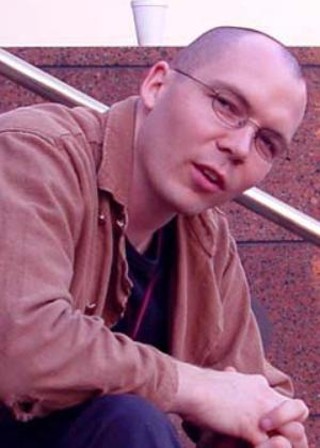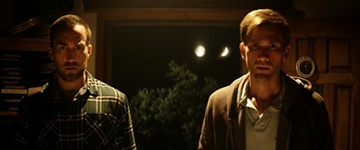Jonathan Blow Talks Fantastic Fest
Indie gaming stalwart talks ethics, elves, and Braid: The Movie
By James Renovitch, 4:00AM, Thu. Sep. 23, 2010

Jonathan Blow isn't a household name, but the man is somewhat of a deity in indie gaming circles. He makes mind-fryingly difficult games (e.g., Braid), co-founded the Indie Fund for small developers, and has no problem taking it to the big boys of gaming. Here is what transpired when I got him on the phone*:
Austin Chronicle: Will you have met filmmaker Nacho Vigalondo before your panel with him about the apparently difficult transition from video game to film?
Jonathan Blow: No, in fact I'm going to have to watch some of his movies this week.
AC: Have you not seen Timecrimes yet?
JB: No, but I hear it's cool.
AC: It's going to blow your mind.
JB: I think the panel is going to be a wacky pairing of people coming at something from different angles and we'll see what happens.
AC: Have there been films that have inspired your games?
JB: My last game Braid definitely had a few films that inspired it, although not in ways that are directly apparent. The biggest influence was David Lynch's film Mulholland Drive. It's hard to describe what the influence was, but it has something to do with the intricate structure of the world presented in Mulholland Drive. I explained this much better to someone recently.
AC: Oh, thanks.
JB: There's something about that movie, even though film is a passive medium, it's very interactive in a certain way. It lays this network of associations and causes and effects in your mind, and you have to try to unravel the riddle of what's going on. It leads you to certain chains of deduction. The way we think of chains of deduction in Western society is if A then B then C ... and eventually you get to the answer. The way the mind follows from one idea to another when trying to solve a mystery, the movie sets them up so they're contradictory or they twist around each other like a film strip and it's flipped over. It's really fascinating how Lynch managed to do that and never talk about it afterward. It's an amazing movie in that way. On top of that it has the usual cinematic virtues: The cinematography's great, and the soundtrack is amazing.
AC: Not to mention Billy Ray Cyrus' cameo.
JB: Yeah, he plays the pool guy or something.
AC: I don't remember, my brain turned off the moment I saw him. Do you have any idea why video games make such shitty movies.
JB: I've never tried it so I have no experience with it. Whenever you adapt anything for another medium it's kind of worse. There are rare exceptions to that. I think over time movies have gotten pretty good at making movies from books. Part of it is probably that we just really understand books because we've been around them for so long. The way a book conveys information is not that alien from the way a film does. They obviously are very different, and you have to change a ton of things to make something written work on the screen, but ultimately they are both linear narratives. There are two things going on. One is something that I've given talks on before, but I think that that kind of linear narrative delivery doesn't work very well in games. It's not only because people who aren't very good at writing stories have been writing game scripts, but it's also because the very medium of a game makes it not work very well. It takes away most of the tools used in storytelling. The ways that games deliver value to the people playing them are not in a storytelling mold. So you take that and you try to put it in a medium where a lot of the value comes from storytelling. Basically a film has to make it all up because it wasn't there in the game. The game probably had some hokey story about an evil guy who you had to beat and movies do that all the time too, but, more than likely, the video game's story wasn't very inspired or interesting. So you have to start making stuff up, and it's probably done by people who don't understand video games and so don't know what an appropriate thing to substitute would be. There's also the idea that video games are made for teenage boys. Which is less true now, but it's still true to a degree. So you have this entire genre of films made for teenagers who are going to buy snack food. Then producers get the idea that it's being targeted to this demographic and quality expectations plummet. I don't know. In my imagination you wrap all those things up and they all conspire to ensure that it's not a good idea to make a video game movie.
AC: So there's no Braid movie in the works then?
JB: No there isn't. I've actually had film people get in touch with me about that.
AC: Tell me it was some famous director.
JB: Mostly it's bottom feeders actually. It's some guy who works at some agency, one guy worked at Disney. Disney is never going to make a Braid film that's any good. So I didn't take that too seriously. People who weren't that interested in it, but wanted to option the property, because [adopting a slightly sleazy air] "you never know, hey, if the movie gets made then we get our cut." There was never anything that was a serious conversation. I've thought about this: I want a movie (if there ever were to be one) to be good and what would that require? I came to the conclusion that it has to be very different from the video game. It would only be loosely related to it. Instead of puzzles that you have to think through, I guess you would have some visual puzzle in the frame? I don't even know what that would be. It would be a very challenging film to make. So I would only ever say yes to that with someone who really loved the game and was a talented filmmaker, and the chances of that are pretty low.
AC: I'm imagining agents calling you and saying "Jonathan, here's the idea: Dakota Fanning is the Braid. Let's make this happen."
JB: Nothing that blatantly bad every happened. That kind of slimy "Hey man, I love your work" was in full effect.
AC: They actually said "I love your work"?
JB: Yeah.
AC: I wonder if some guy in a cubicle has the job of calling every game developer in an attempt to option video games for film. Just in case. "OK, who's next on the list? Jonathan Blow, here I come."
JB: I seriously think it's like that. I talked to this one guy from Disney and told him, "Braid was a pretty popular game for what it is, but 600,000 people bought it, which is great for an independent game, but a $60 game you buy in a store sells 6 million if it's a hit, you realize that." And he said, and I'm paraphrasing, "We're so hard up for ideas in movies that anything is a plus."
AC: [laughs] Another Fantastic Fest panel is called Wizard Takes All? Do you have any idea why game designers fall back on the standard tropes of ogres and mages?
JB: I'll lead off by saying that I really appreciate when games do something different, like take a different setting or a unique core set of ideas to base their world around. But what that does though is it provides a set of conventions that everyone understands. If you have your Tolkien-esque fantasy world then you have that set of givens that makes it easier to build on in terms of game mechanics. You don't have to teach players everything from scratch.
AC: So, designers are just playing it safe.
JB: Well, no, not so much. There is some of that. But it's also not that intellectualized. Some of them probably sit down and think what I just said, but there's an audience preference. People make these games in worlds that you've never heard of and nobody buys them. That could be because they don't know what they're going to get. If you say this games has some dwarves and elves they know what they're going to get.
AC: Attitudes toward games like these remind me attitudes toward romance novels. People don't read romance novels to be surprised, they read them to get what they want.
JB: It's like chain restaurants. It's not that they're good, but if you're somewhere and you see a McDonald's, you know what you're going to be able to get. There's something about the human psyche that enjoys that degree of familiarity, because it enables you to make a plan and execute it. When it comes to games, I think something very similar is going on. It's easy to visualize how you would have fun playing a game where you're fighting orcs. It's harder to visualize if they are made up things that you don't recognize. In that way buying a game is basically an emotional decision about whether or not you're going to enjoy a game. The more readily you can help them envision how they're going to like the game the more readily you're going to be able to sell it to them.
AC: Another panel is called "Ethics in Games," and I wanted to know what ethical responsibilities you put on game designers and what blame might lie with the consumer or player.
JB: I actually think of a lot of modern game design as somewhat unethical to very unethical. The standard things that are considered to be good game design practices these days I feel they are crassly manipulative of the player and don't respect the player as an actual human that you care about. I don't think in terms of "Is thing A ethical, and is thing B unethical?" As a designer I say, I'm going to make something for an audience that I respect, and if you respect someone there are certain things that you're just not going to do. That would be my guideline to anyone else who is a designer. It becomes a process though when you look at a particular game design or common idea nowadays of what's a best practice in game design and you really start asking, "Why does this work? What's it doing in the mind of the player?" It's pretty easy to come to the conclusion that it's a bad idea. You have to be inquisitive and keep asking.
AC: That kind of active playing and designing seems to be the exception to the rule.
JB: That's why I'm an independent developer as opposed to working for a larger company, because I have specific ideas about what kinds of things I want to do. You generally can't make those games with any kind of freedom in the structure of a larger public company. At least not in the current environment. I have a design agenda and I try to pursue that. While I'm doing that I'll be very happy to make money at the same time. I want to make games that are mind expanding and that ask something of the player and in return help that player develop skills or gain insight or something like that. What exactly that is varies from game to game. All that stuff that I said is different from wanting people to have fun. I think it's fine if people have fun while they're playing a game that I make, but that's not why I make them. On the business side it's not really about making as much money as possible. If that were true I probably wouldn't be making the games that I'm making. It's very clearly possible to make more money than anyone needs by giving people things that are actually good.
* I've changed my questions to make myself sound smarter. You should have read them before I changed them.
A note to readers: Bold and uncensored, The Austin Chronicle has been Austin’s independent news source for over 40 years, expressing the community’s political and environmental concerns and supporting its active cultural scene. Now more than ever, we need your support to continue supplying Austin with independent, free press. If real news is important to you, please consider making a donation of $5, $10 or whatever you can afford, to help keep our journalism on stands.
Richard Whittaker, July 31, 2018
Richard Whittaker, April 20, 2018
April 5, 2024
April 5, 2024
Fantastic Fest, Jonathan Blow, Fantastic Fest 2010, Braid, Fantastic Arcade, Mulholland Drive










